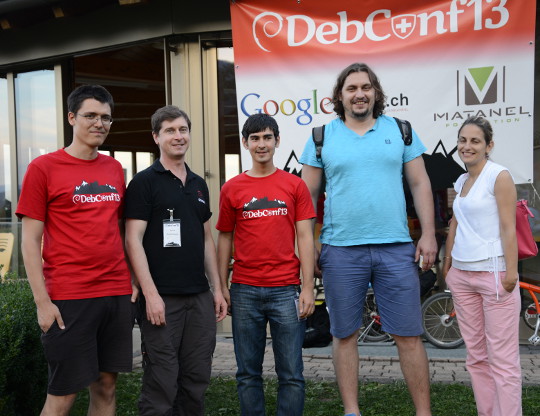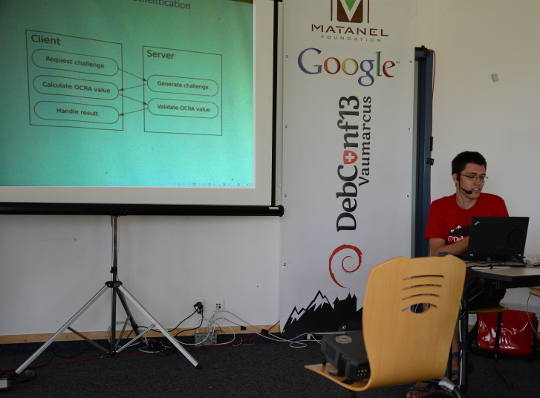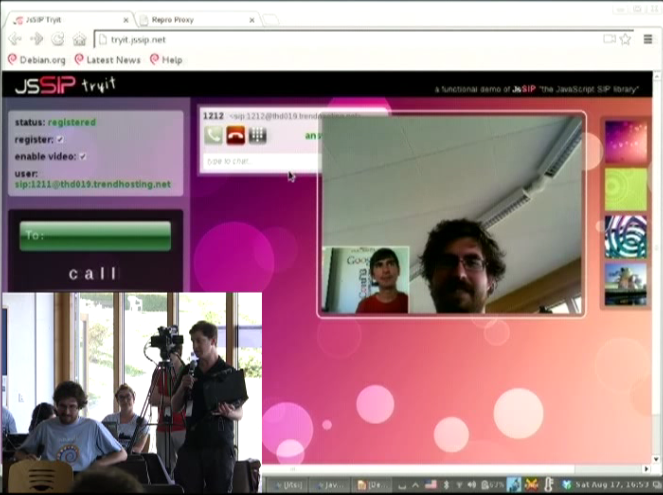Saturday, 17 August was a day that saw groundbreaking new work revealed at
DebConf13 and may have been a watershed moment in the emergence of
WebRTC for the free software community.
 Fabian Gr nbichler, Daniel Pocock, Catalin Constantin Usurelu, Emil Ivov, Yana Stamcheva
Fabian Gr nbichler, Daniel Pocock, Catalin Constantin Usurelu, Emil Ivov, Yana Stamcheva
Advancing the use of One Time Passwords with free software
Google Summer of Code (GSoC) student
Fabian Gr nbichler has spent the summer enhancing
oath-toolkit and
dynalogin to support a more diverse range of
One Time Password schemes.
dynalogin's original 1.0 release supports vanilla
HOTP and
TOTP authentication schemes. Fabian's work has extended the framework to support the more generic and powerful
OCRA approach. To find out about all the benefits this brings, I would strongly encourage you to review his
slides and video presentation, with a demo where it is explained thoroughly.
While there are existing hardware tokens that support
HOTP and
TOTP using this open algorithm (
Gooze has been kind enough to donate some which were on display), the mutual challenge-response schemes are yet to be widely supported in hardware and this means that Fabian's work is now at the cutting edge of development in this area.

WebRTC: premium voice/video chat in modern browsers,
no plugin required

Another member of Debian's GSoC program,
Catalin Constantin Usurelu helped organise and run one of the
must-see sessions of DebConf13 (video available). In a demonstration that had all the hallmarks of a magic show, Catalin and I took random members of the audience and invited them to wave a magic wand over their web browsers and effortlessly turn them into Skype-busting softphones.

As the grand finale, we took
Wookey's blog and showed him how to add a WebRTC "call-me" page in less than 20 seconds, less time than it takes to hand over all your private data to the registration process of those rather uncomfortable alternatives. Anybody else seeking to duplicate this effort is encourage to review options like
Drucall for
Drupal or just directly use
JsSIP
Jitsi and the Jitsi Video-bridge

The grand-finale of the
DebConf13 real-time communications track was our guest speaker,
Emil Ivov, founder of the
Jitsi softphone project.
Jitsi itself has recently been
accepted into Debian and is easier than ever before to install and use.
Emil's talk (
video and slides available) went into some detail about the cutting edge development activities of his team, particularly the new
Jitsi Video bridge
Subsequent to the talk, we had some out-of-bands discussion about ways to potentially integrate
Jitsi Video bridge with the open source
dvswitch system used to produce streams and recordings from free software events such as
DebConf and
FOSDEM. It is hoped that this will provide an additional option for remote participation at free software events of all sizes.
Upcoming events
Emil and I have been invited to participate in the
WebRTC Conference Paris 2013 in December. This will be an excellent opportunity to have further discussion about progress with
WebRTC and do more to raise the compelling case for premium quality free software to meet the demanding needs of modern business communications. There are a series of talks for both technical and business-oriented audiences.

 My previous blog posts about deterministic Doom proved very popular.
The reason I was messing around with Doom's RNG was I was studying how early
versions of Doom performed random pitch-shifting of sound effects, a feature
that was removed early on in Doom's
history. By fixing the
random number table and replacing the game's sound effects with a
sine wave, one second long and tuned to middle-c, I was able to determine
the upper and lower bounds of the pitch shift.
Once I knew that, I was able to write some patches to re-implement pitch
shifting in Chocolate Doom,
which I'm pleased to say have been accepted. The patches have also made their
way into the related projects Crispy Doom
and Doom Retro.
I'm pleased with the final result. It's the most significant bit of C code I've
ever released publically, as well as my biggest Doom hack and the first time
I've ever done any audio manipulation in code. There was a load of other notes
and bits of code that I produced in the process. I've put them together on a
page here: More than you ever wanted to know about
pitch-shifting.
My previous blog posts about deterministic Doom proved very popular.
The reason I was messing around with Doom's RNG was I was studying how early
versions of Doom performed random pitch-shifting of sound effects, a feature
that was removed early on in Doom's
history. By fixing the
random number table and replacing the game's sound effects with a
sine wave, one second long and tuned to middle-c, I was able to determine
the upper and lower bounds of the pitch shift.
Once I knew that, I was able to write some patches to re-implement pitch
shifting in Chocolate Doom,
which I'm pleased to say have been accepted. The patches have also made their
way into the related projects Crispy Doom
and Doom Retro.
I'm pleased with the final result. It's the most significant bit of C code I've
ever released publically, as well as my biggest Doom hack and the first time
I've ever done any audio manipulation in code. There was a load of other notes
and bits of code that I produced in the process. I've put them together on a
page here: More than you ever wanted to know about
pitch-shifting.

 Another member of Debian's GSoC program,
Another member of Debian's GSoC program,  As the grand finale, we took
As the grand finale, we took  The grand-finale of the
The grand-finale of the 